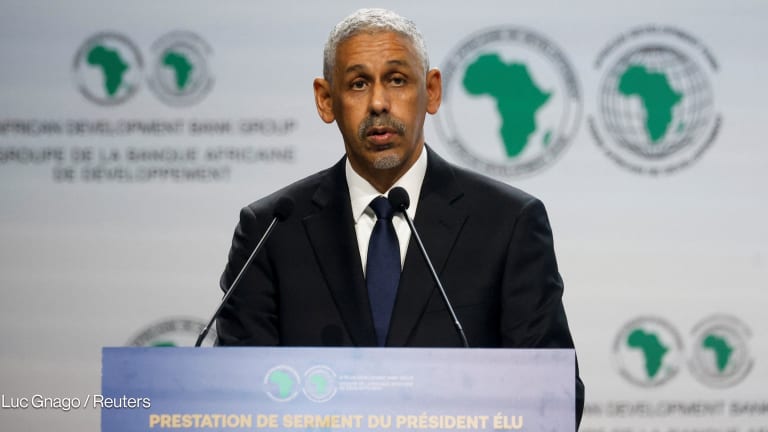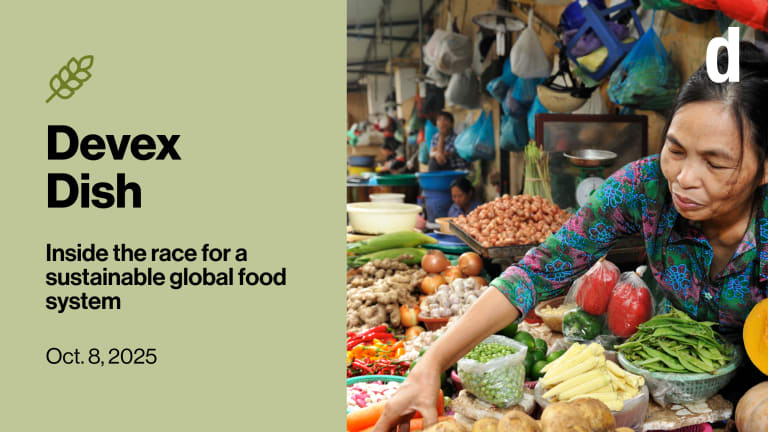
ABIDJAN — The African Development Bank launched a new Multi-Sectoral Nutrition Action Plan Tuesday as it pushed human capital investment as a way of unlocking Africa’s economic potential — including by harnessing its “grey matter infrastructure,” or a population’s brain power.
“Externally, the bank is usually known for infrastructure — building roads, dams, and so on — but we’ve also come to realize that the absence of nutrition at the very early stages of life impacts on education, impacts learning outcomes, and in the long run impacts on stunted grey matter infrastructure of adults which eventually impacts our economy,” Oley Dibba-Wadda, director of human capital, youth, and skills development at AfDB, told Devex during the launch.
“If we don’t have healthy, educated people that understand the importance of having a healthy diet then it defeats everything else we’re trying to do for the African continent.”
— Oley Dibba-Wadda, director of human capital, youth, and skills development, AfDBExperts argue that investments in nutrition, particularly during the 1,000 days between conception and age 2, would drastically reduce stunting, a chronic public health issue impacting 53.7 million children across sub-Saharan Africa. By focusing on this critical window, the bank estimates that investments could prevent 24 million from being permanently weaker, shorter, vulnerable to disease, and less cognitively able.
Stunting is caused by a combination of poor water, sanitation, and hygiene conditions, illness and a diet lacking in necessary vitamins and nutrients. Sub-Saharan Africa is the only region where the number of stunted children rose over the period 2000-2017, the World Health Organization’s global health observatory found.
Through its 2018-2025 action plan, AfDB has committed to scaling up the proportion of nutrition-smart investments in five sectors that account for more than 30 percent of government spending: education and skills; WASH; social protection; health; and agriculture. One example is a $38.5 million project in The Gambia designed to improve the socioeconomic and environmental conditions of rural populations through rehabilitation of water resource management systems, to increase access to safe water by 17 percent.
In partnership with Big Win Philanthropy and the Aliko Dangote Foundation, AfDB hopes its investments will reduce stunting by 40 percent in African children under age 5 by 2025.
“By leveraging investments across five sectors, and encouraging its member countries to do the same, the African Development Bank is achieving 'double wins' for every dollar spent: improving lives and generating economic growth,” Big Win Philanthropy Chair and President Jamie Cooper said at the launch event. “In terms of human development, nutrition is as important as investments in infrastructure and power [are] in stimulating economic growth," Cooper said.
The strategy encourages AfDB member countries to prioritize nutrition-smart borrowing requests that demonstrate nutritional as well as social and economic impact.
Earlier this year, an African Leaders for Nutrition initiative was launched by AfDB and African Union. The network of high-level political leaders and other high-profile figures aims to spur investment in nutrition across the continent.
AfDB also plans to mainstream nutrition into the bank’s portfolio and pipeline, including in lending and country/regional strategies. It has committed to including nutrition-smart investments in half of its health and agriculture investments, 15 percent of its WASH lending, and 10 percent of social protection funding.
Another component of the action plan aims to increase the production and consumption of safe and nutritious foods.
“Malnutrition is having a big-time impact on African economies, which are losing $25 billion a year due to malnutrition … and it is highly linked to the achievement of many SDGs,” Babatunde Omilola, AfDB division manager of public health, security, and nutrition, said during the launch event.
Over the next six months, the bank will host information events in regional hubs including Pretoria, South Africa; Tunis, Tunisia; and Lagos, Nigeria, to increase the plan’s visibility and to encourage cross-sectoral collaboration and participation.
“We can build the bridges and do all this [construction and infrastructure] work but if we don’t have healthy, educated people that understand the importance of having a healthy diet then it defeats everything else we’re trying to do for the African continent,” Dibba-Wadda told Devex.








